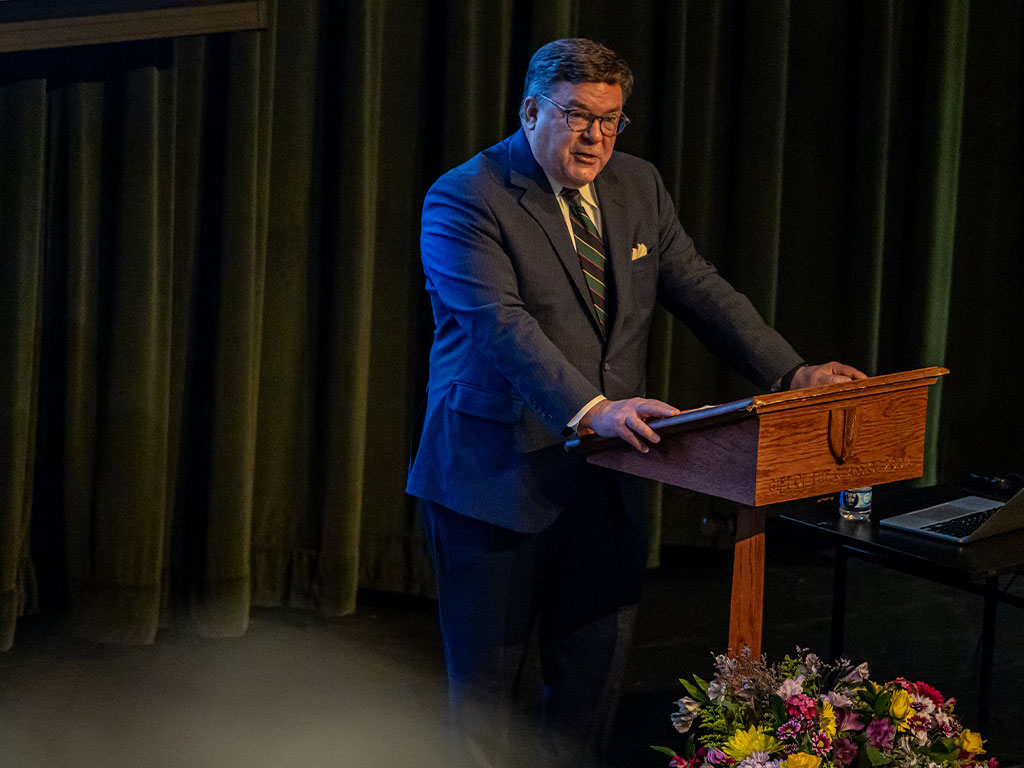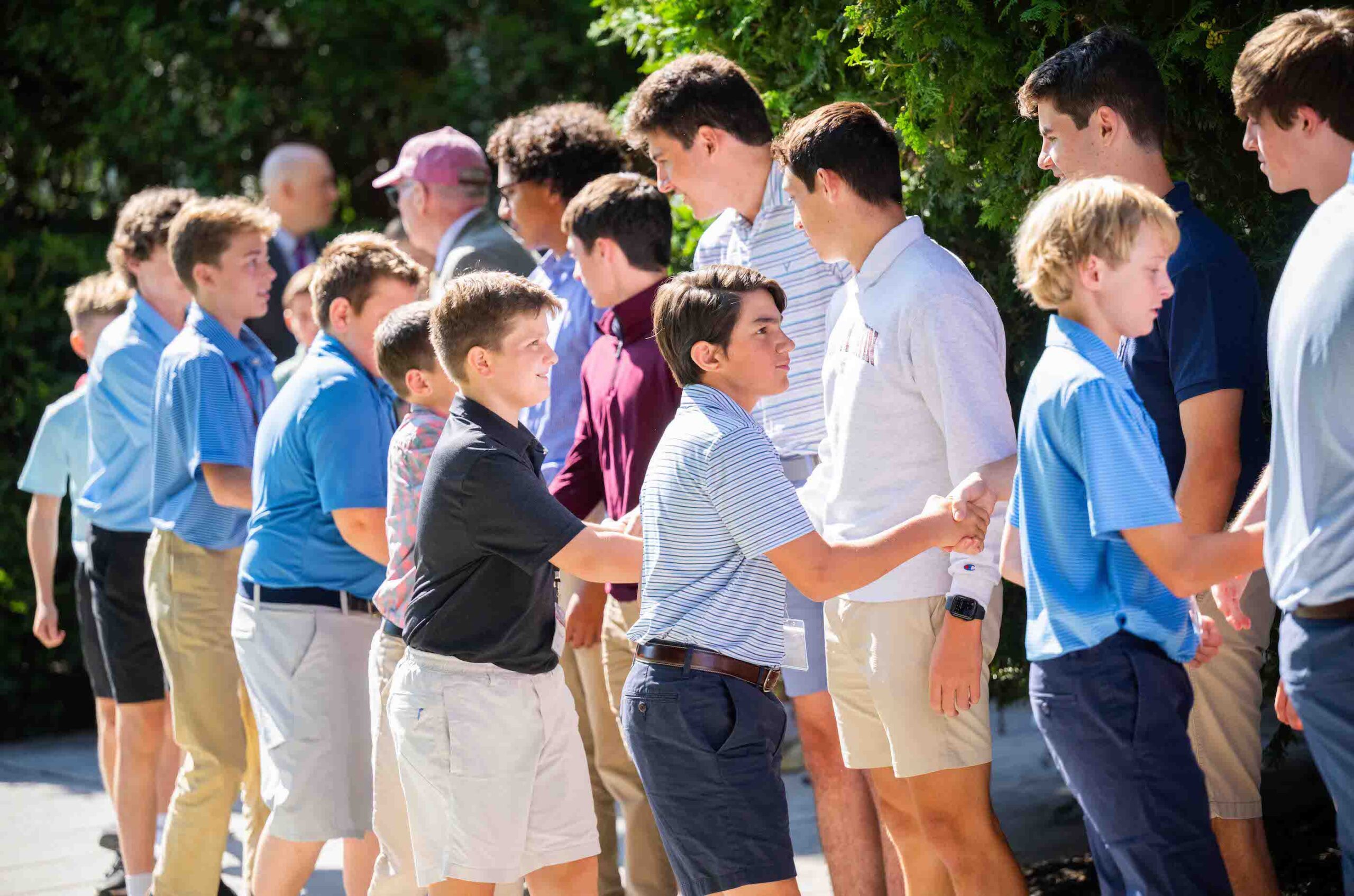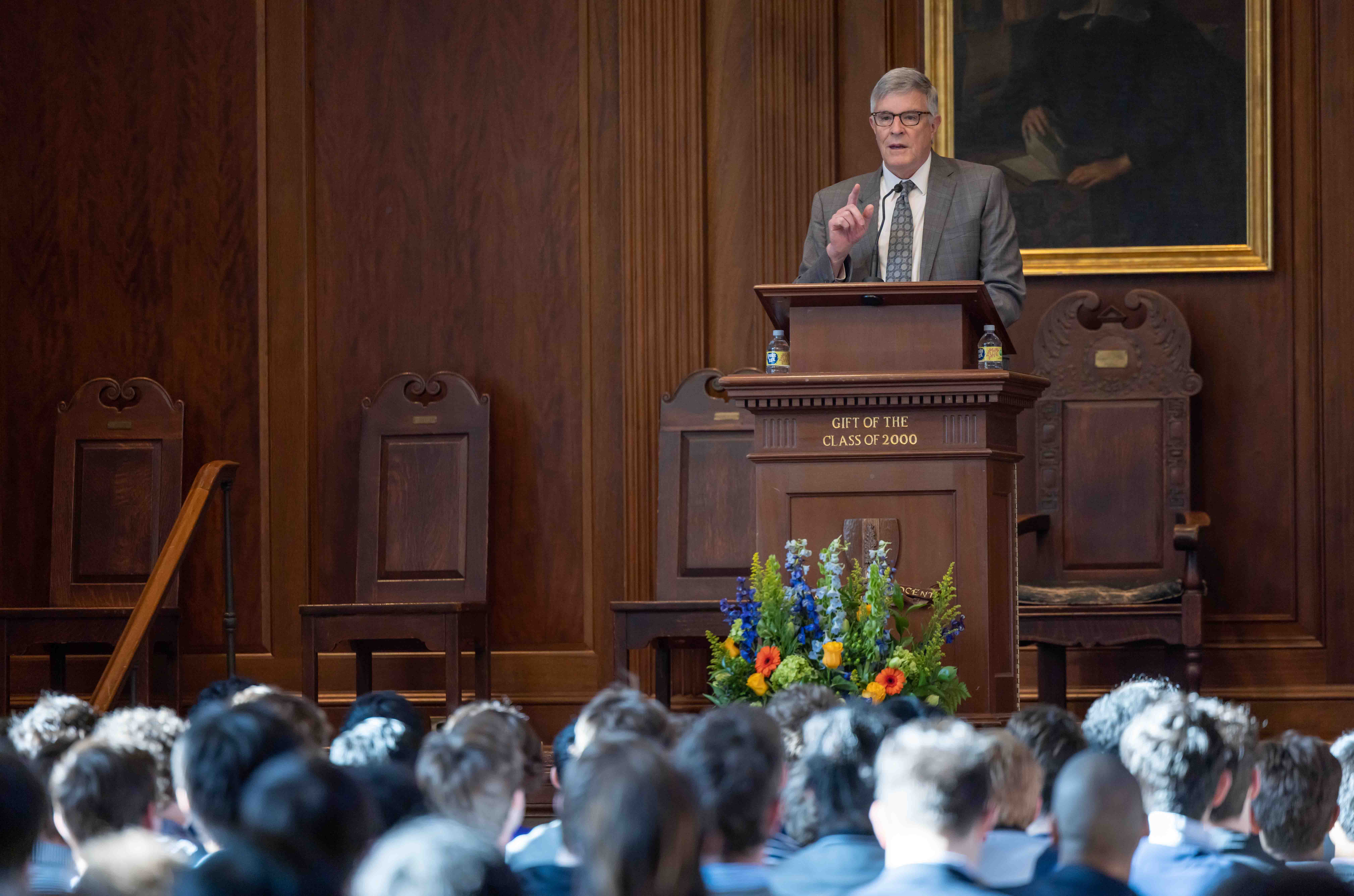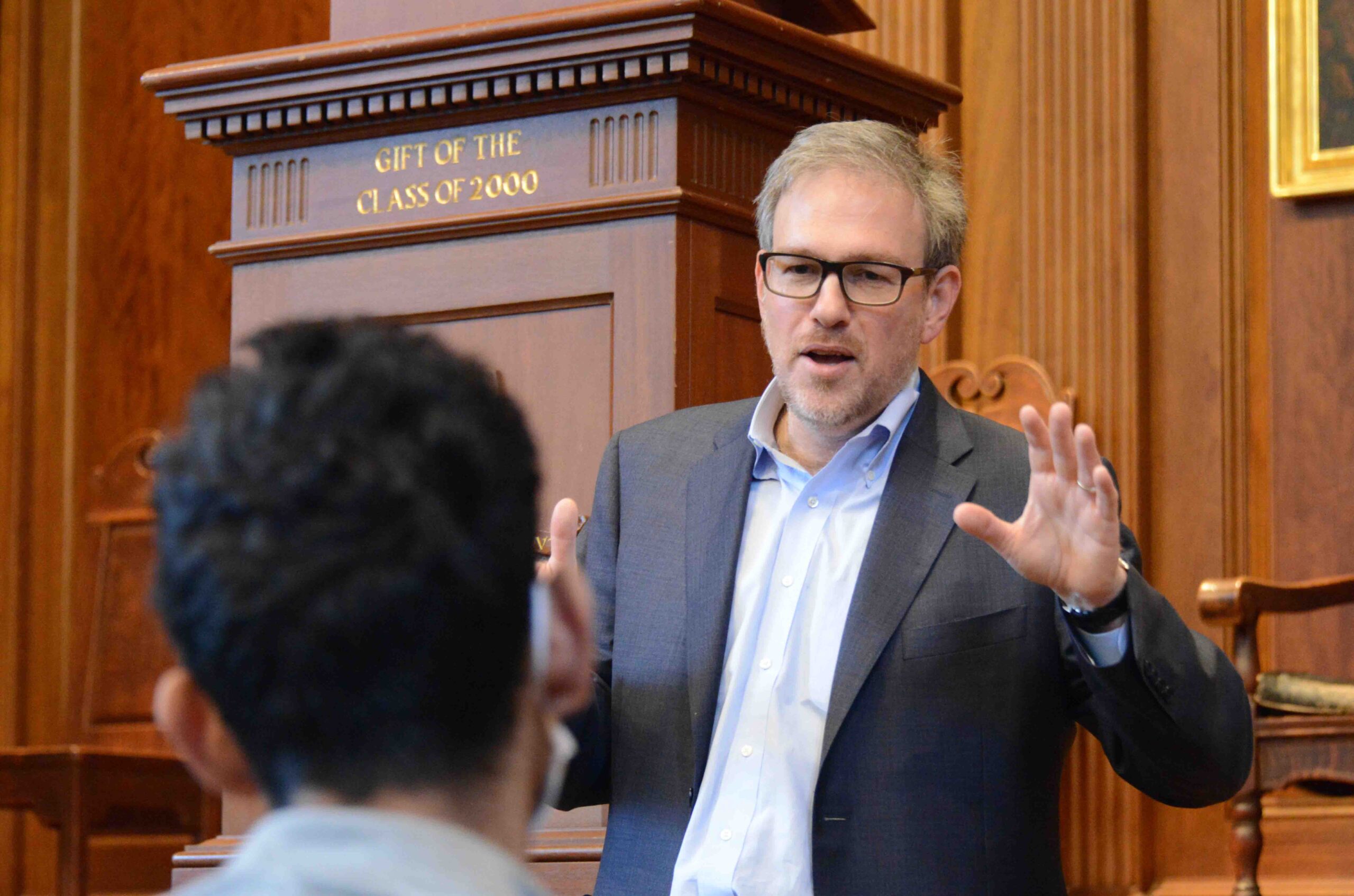On Monday, April 3, Mike Pojman—Associate Headmaster and member of the Roxbury Latin faculty since 1980—opened the spring term in Rousmaniere Hall, by sharing with students and colleagues 19 life lessons that he has come to rely on. Mr. Pojman will retire at the end of this school year. Below are his Hall remarks, in full—lessons by which we can all live:
I want to thank Mr. Brennan for giving me the opportunity to share a few thoughts with you as I speed-walk through the final lap of my Roxbury Latin career.
I’ve titled this talk “Lessons Learned,” and I’ve been working on it for the last 43 years. Naturally, you guys think that we teachers spend all our time teaching, but, in fact, we are constantly learning, too—from the collective experiences gathered throughout our daily lives, from our colleagues and friends, and even from you. What follows is a compilation of the most important lessons that I have learned over the years, and I’m eager to share them with you now.
And by the way, there’s no need to take notes. I plan to send the list home to your parents so that they can reinforce them over and over again. So, if your mother pastes them up on your bathroom mirror, blame me not her. Now let’s get started.
Number 1: Don’t take yourself too seriously. Get over yourself. People who look to be offended usually will be, and they set themselves up to suffer the slings and arrows of everyday life with a lot of unnecessary pain. I have a relatively high opinion of myself, but I try not to let it get the better of me. Over the years I’ve been told that I’m smart… and good looking… and athletic… and I believe my mom. But I don’t let it go to my head. I can take a good-natured joke at my own expense, and you should be able to, too. But there’s a big difference between an affectionate jibe and a putdown, and you know the difference. For example, I like to have some fun kidding my good friend Chris Brown—I’m referring to the teacher, not the rapper—because he’s a young whippersnapper. But he takes it in stride, because he knows that it’s true. But he also knows that I regard him as one of the most talented and effective teachers I ever worked with. And of course, if I get carried away, Mr. Brown can always throw it in my face that I’m old enough to be his grandfather.
Number 2: Avoid the Debby Downers. In other words, hang around with people who buck you up rather than drag you down. Stay away from the constant complainers, the eternal pessimists, and the cynics—the people whose lives always seem to be a glass half empty, and who go out of their way to convince you that yours is, too. Those people sap your energy. We all have days when we find it difficult to get out of bed. The last thing you need is to spend time with people who make you sorry that you did.
And here’s a corollary: If you find that you are becoming a Debby Downer, the best way to make yourself feel better is to go out of your way to make someone else feel better. Try it. It works.
Number 3: Mix it up a little. We’ve all just returned from Spring Break, renewed and energized. But how about that endless third marking period? How many of you were caught in the doldrums at some point during that three-month grind? Here’s what to do when you find yourself stuck in a rut: Break up your routine. Switch things up a bit. Go out for a walk before sitting down to work. Study your Latin before you begin your math, instead of the other way around. Have something to look forward to every weekend. It doesn’t have to be something big, just different. Plan to go out for pizza with friends, pick up that book that you started last summer and never finished, play a couple hours of video games—no, don’t do that! If all else fails and you are still feeling low, rearrange the furniture in your room. It sounds silly, but it really works. You might also find that missing sock when you move your bed.
And here are a couple of other ways to snap out of a funk: Do a good deed out of the goodness of your heart—something simple, nothing dramatic. Help a classmate with his homework, take your mother to breakfast, hold the door for a sixie, start a conversation with a classmate that you don’t usually hang around with. Play Dungeons and Dragons with Mr. Fitzgerald. Close talk with Mr. Sugg. Invite Mr. Randall to join you in a BeReal. Do something nice for two different people every day—and preferably not against their will.
Number 4: This one should go without saying. Names matter. One of the benefits of a small community is that we know each other. We often say that Roxbury Latin is a place where every boy is known and loved—and called by his name. When you run into a teacher in the hallway, call him by his name—or her name—and I mean our real name, not the one you use behind our back. And that goes for your schoolmates, too. Greet each other by name, or by nickname, if it’s affectionate. I daresay we’ve slipped a little in that regard lately—though not you sixies, because Mrs. Carroll has trained you so well.
Number 5: Don’t be a know-it-all. The smartest person in the room is the one who makes everyone else feel like the smartest person in the room. You don’t have to be the one with all the answers. Try listening before speaking. Let someone else make the first comment, and let him finish his thought before jumping in. You may even find that he has something to say that you didn’t think of. Let me say it again: The smartest person in the room is the one who makes everyone else feel like the smartest person in the room. I’ve spent my entire career making all of you feel more intelligent than I am. That’s why I give easy chem tests.
Number 6: Follow through on a promise. How many times has someone promised to do something—forward an email to you, send an article they’ve read, share a link—and they don’t do it? We’ve all been guilty of that. Here’s a simple rule: Don’t promise what you can’t deliver. And be sure to deliver on your promises. The boys on the Glee Club tour to Nashville just had the pleasure of spending an evening jamming with the French Family Band who performed here last year. Remember rock star Sonny? When we reached out to Sonny’s mom, Camille, to see if they could possibly get together with us, she went out of her way to make it happen. Everything she promised to do, she did—and even more. She didn’t have to go to all that trouble, especially since they were preparing for their debut at the Grand Ole Opry a week later and certainly had bigger things to worry about. In the world of country music, playing at the Grand Ole Opry is making it to the top. Sonny’s mom made us a priority by following through, and I will always remember that. It is a well-known fact that people who make it to the top, always follow through.
Number 7: I have come to find that there are three types of people in the world, those who make problems, those who are undone by problems, and those who solve problems. Let’s start with those who make problems. Fortunately, we don’t have too many of those around here. And those who do cause problems, rarely do so intentionally, so let’s not worry about them. The biggest group are those who are stymied—or at the very least rattled—by problems. They don’t know where to begin. They are easily discouraged. They waste a lot of energy fretting. Years ago, before the invention of the laptop, we had a lot of computer work stations around the school, including in the Chem Lab. I remember a very smart boy who was trying to sign into his school account so that he could write a Tripod article. After some period of frustration, he said to me, “Mr. Pojman, this computer isn’t working.” “Do you have the right password?” I asked. “Yes, but I can’t enter it. The screen is blank.” “Did you try the on-switch?” I asked, with a touch of sarcasm. “Yes, but nothing happened.” “Then it must not be plugged in,” I replied. “Plugged in?” he answered, his face as blank as the screen. “What do you mean, plugged in?” Apparently, he was not acquainted with the concept of a wall socket. I’m happy to say that that boy went to Harvard. I can say with less confidence that he actually graduated. Be a problem solver. Problem solvers get things done. Those of you who ride the T know that the system is in a bad way right now. Governor Healy has just hired a man named Phillip Eng as the general manager. He is 61 years old and coming off a highly acclaimed career as the manager of the New York transit system’s Long Island Railroad. Surely, he has no need to risk his reputation at this stage of his life by tackling problems at the MBTA which many feel are intractable. Clearly, he’s a problem solver. Problem solvers assume that every problem has a solution, and they take pleasure in finding it. Remember that, all you Bettendorf calc students.
Number 8: You probably aren’t familiar with the term “offer it up,” but those of my generation who went to Catholic school know it well. When we were feeling put upon and sorry for ourselves—for whatever reason—and we wanted a little sympathy, the nuns would tell us to “offer it up to Jesus” as a reminder of the pain he suffered on the cross. It’s an old-fashioned idea these days, but it was actually good advice. Life delivers its minor bumps and bruises. Take them in stride. Don’t give in to self-pity. I remember once as a little kid complaining to my mom that I had a stone in my shoe. I expected her to fix it, but instead she said, “Well, just walk around with it for a while. It’s not a bad thing to put up with a little discomfort.” Now that I know how to tie my own shoes, I usually remove the stone—but sometimes I don’t.
Here is one of my pet peeves: Whenever I am at a school event, and I see people putting their name tags on their left lapel, I feel compelled to correct them: Take it from an expert, boys. Your name tag goes on your right lapel. Here’s why: When you go to shake hands, you naturally turn your body to the right as you extend your hand—like this…. That means, as you rotate toward the person you are shaking hands with, your name tag will rotate with you—toward that person. As a result, it will be easier to read your name on your right lapel as it moves closer than it would be on your left when it would move farther away. It’s a subtle but friendly gesture. Now, of course, none of this makes sense if you are left-handed. Even so, I still suggest that you put your name tag on your right lapel, because if you don’t, you will be announcing to the world that you are a lefty, which is unfortunate, as you might then discover that some people may not want to shake hands with you.
Here’s another lesson in social etiquette: Whenever you are at a sit-down meal, don’t start eating until everyone at the table has been served. It’s impolite.
And here’s one more: Despite having taught a couple thousand kids in my career, I generally remember my former students better than you might think. But let’s say you are an alum who has been out for 10 years, and I run into you at the checkout line at Whole Foods, and your hairline has receded halfway across the top of your head, and you’ve gained thirty pounds since graduation, and you’ve lost all your front teeth—and, since you didn’t introduce yourself, well, there’s a slim chance that that I won’t recognize you, or even that I won’t remember your name. It’s unlikely, but it could happen. And if that were to happen, and you haven’t introduced yourself, I will smile politely and pretend that I know who you are, while actually thinking to myself, “Who the heck is this guy”—and I probably won’t hear 90% of what you are saying while I try to figure it out. However, if you do introduce yourself, the pressure will be off, and we can then have a nice conversation: “Hi, Mr. Pojman, it’s Peter DeVito. Remember me?” And because you introduced yourself, I’ll say, “Of course I remember you, Peter”—even though you are 30 pounds overweight, and you’ve lost most of your hair, and all of your teeth—and I will hang on every toothless word you have to say.
Number 12: I call this next lesson “Take the hint.” Let’s say that you are with a group of friends and you begin to tell a rather lengthy story. As far as you can tell, everyone is riveted to every detail. And then let’s say that halfway through your story, someone comes along and interrupts you: You are at Bertuccis, and a waiter named Chuck cuts you off mid-sentence to say that they’ve run out of rolls and chicken parm. Or you’re standing in the lunch line bragging about how you grubbed some extra points on the Honors Chem test, when Mr. Kelly distracts everyone by going after Mr. Tran for not having his shirt tucked in. Or you are in the Study Center predicting the outcome of the Final Four, when Mr. Heaton comes over and threatens to boot you for talking louder than Mr. Thomsen. It happens all the time, right? Well then let’s say that you wait patiently for the disruption to end before taking up where you left off. And finally it does. And when it does—and here’s the point—if nobody says, “And then what happened?” take the hint and don’t tell them.
And while we’re on the subject of the dress code, if you are having trouble keeping your shirt tails tucked in, pin them to your underwear. I’m talking to you, Matt Hoover…
Number 14: If you take pleasure in annoying your elders, remember that one day you will be one.
I especially hope that you will take this next one seriously. I call it, Compliment Sooner, Criticize Later—or preferably not at all. It’s an RL epidemic—being quick to find fault. Owen Butler does many wonderful things for this school, and serving as Tripod editor is probably one of the most consequential but least heralded. He and his staff work harder than you realize to produce a top-notch school newspaper. It takes hours of work. Naturally, a word or two of appreciation is always welcomed. After every edition I ask Owen, “So, what have you heard about the paper?” Now we all know that Owen never stops smiling, even when three classmates make a point of telling him—before he’s even left homeroom—that Carter Crowley’s byline had him listed as being in Class VI rather than in Class I. Picky, picky, picky. But of course, with Carter, sometimes it can be hard to tell whether he’s a senior or a sixie.
Number 16: We’ve all had times when we’ve felt overwhelmed, even boxed in. If you are in a real fix and you don’t know how to get out of it, imagine the worst-case scenario and work backward. What’s the worst thing that will happen if you get a C in math? Or a B+ instead of an A- on that history paper? Take a step back and you’ll probably conclude that getting that C, or that B+, would not be the end of the world. But the worst-case scenario rarely happens, and thinking through how you would handle it if it were to happen will make any lesser, and more likely, outcome seem like a stroll through the park.
Number 17: When you have too much to do, and you don’t know what to do, just do something. Once you’ve gotten started, you will find it easier to keep going, especially if you tackle the most onerous challenge first. Put one foot in front of the other, and before you know it, you will have covered a lot of ground.
Number 18: Work hard, but don’t overdo it. Give yourself a break from time to time. No matter how busy you are, always make time to relax. You can only grind away for so long before you start to wear down. I’m always shocked when a fifthie tells me that he worked on his English paper until 4 a.m., or when a senior says that he only got a couple hours of sleep over the last two days. When it comes to studying, there’s a point of diminishing returns, and you probably reach it by midnight at the latest. Promise yourself that you will never pull an all-nighter. Ever. You need your sleep. I need my sleep. At my age, an all-nighter is not having to get up to go to the bathroom.
Number 19: Finally, just say thanks. We recently heard Eric Zhu blow us away in a Recital Hall. Naturally, you wanted to compliment him on his fine performance, so you went up to him and said, “Wow, Eric, you really rocked that Bach.” Even though he’s a perfectionist, he didn’t point out to you that he played the first note of the fifth measure of the second movement andante when it should have been pizzicato. He just said thanks, because had he said anything more than that, you would have felt that he saw you as either an undiscerning listener or an idle flatterer, and it would have made you feel bad. So, the next time that someone finds a reason to compliment you, just say, “Thanks. I appreciate that,” even if you don’t think you deserve it. When I see you around school later today, and you come up to me to say, “Hey, Mr. Pojman, that was a killer speech,” I won’t say, “Yeah, but the Gettysburg Address was better.” I’ll just say thanks.
I’ve now shared nineteen life lessons with you, and I want you to know that I practice every one of them every day. I hope that you will, too, because if you do, they will definitely make you a better person. But if for some reason you decide not to take them to heart, well, all I can say is that at least you will have a measure by which to know that you are not nearly as virtuous as I am.
But wait, before I leave the stage, I have one more. You’ve heard me say it a hundred times, and here it is again, for good measure. It’s simply this: Remember, no matter where you are or when it might be—next week, next month, next year, twenty years from now—promise me that you will never, ever, and I mean never take more than One Good Ice Cream.










